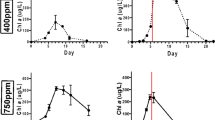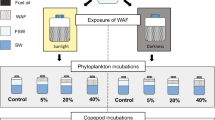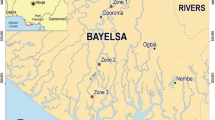Abstract
Oiling scenarios following spills vary in concentration and usually can affect large coastal areas. Consequently, this research evaluated different crude oil concentrations (10, 40, and 80 mg L−1) on the nearshore phytoplanktonic community in the southern Gulf of Mexico. This experiment was carried out for ten days using eight units of 2500 L each; factors monitored included shifts in phytoplankton composition, physicochemical parameters and the culturable bacterial abundance of heterotrophic and hydrocarbonoclastic groups. The temperature, salinity, and nutrient concentrations measured were within the ranges previously reported for Yucatan Peninsula waters. The total hydrocarbon concentration (TPH) in the control at T0 indicated the presence of hydrocarbons (PAHs 0.80 μg L−1, aliphatics 7.83 μg L−1 and UCM 184.09 μg L−1). At T0, the phytoplankton community showed a similar assemblage structure and composition in all treatments. At T10, the community composition remained heterogeneous in the control, in agreement with previous reports for the area. However, for oiled treatments, Bacillariophyceae dominated at T10. Hydrocarbonoclastic bacteria were associated with oiled treatments throughout the experiment, while heterotrophic bacteria were associated with control conditions. Our results agreed with previous works at the taxonomic level showing the presence of Bacillariophyceae and Dinophyceae in oil-related treatments, where these groups showed the major interactions in co-occurrence networks. In contrast, Chlorophyceae showed the key node in the co-occurrence network for the control. This study aims to contribute to knowledge on phytoplankton community shifts during a crude oil spill in subtropical oligotrophic regions.




Similar content being viewed by others
References
Aksmann A, Tukaj Z (2008) Intact anthracene inhibits photosynthesis in algal cells: a fluorescence induction study on Chlamydomonas reinhardtii cw92 strain. Chemosphere. https://doi.org/10.1016/j.chemosphere.2008.09.064
Álvarez-Góngora C, Herrera-Silveira JA (2006) Variations of phytoplankton community structure related to water quality trends in a tropical karstic coastal zone. Mar Pollut Bull. https://doi.org/10.1016/j.marpolbul.2005.08.006
Amin SA, Parker MS, Armbrust EV (2012) Interactions between diatoms and bacteria. Microbiol Mol Biol Rev. https://doi.org/10.1128/mmbr.00007-12
Bacosa HP, Evans MM, Wang Q, Liu Z (2018) Assessing the role of environmental conditions on the degradation of oil following the Deepwater Horizon oil spill. In: Stout SA, Wang Z (eds) Oil spill environmental forensics case studies. Butterworth-Heinemann, Oxford. https://doi.org/10.1016/B978-0-12-804434-6.00028-8
Bopp SK, Lettieri T (2007) Gene regulation in the marine diatom Thalassiosira pseudonana upon exposure to polycyclic aromatic hydrocarbons (PAHs). Gene. https://doi.org/10.1016/j.gene.2007.03.013
Bretherton L, Williams A, Genzer J et al (2018) Physiological response of 10 phytoplankton species exposed to macondo oil and the dispersant, Corexit. J Phycol. https://doi.org/10.1111/jpy.12625
Bretherton L, Hillhouse J, Kamalanathan M et al (2020) Trait-dependent variability of the response of marine phytoplankton to oil and dispersant exposure. Mar Pollut Bull. https://doi.org/10.1016/j.marpolbul.2020.110906
Deasi SR, Verlecar XN, Ansari ZA et al (2010) Evaluation of genotoxic responses of Chaetoceros tenuissimus and Skeletonema costatum to water accommodated fraction of petroleum hydrocarbons as biomarker of exposure. Water Res. https://doi.org/10.1016/j.watres.2009.12.048
del Carmen Merino-Virgilio F, Okolodkov YB, Aguilar-Trujillo AC, Herrera-Silveira JA (2013) Phytoplankton of the northern coastal and shelf waters of the Yucatan Peninsula, southeastern Gulf of Mexico, Mexico. Check List. https://doi.org/10.15560/9.4.771
El-Sheekh MM, El-Naggar AH, Osman MEH, Haieder A (2000) Comparative studies on the green algae Chlorella homosphaera and Chlorella vulgaris with respect to oil pollution in the river Nile. Water Air Soil Pollut. https://doi.org/10.1023/A:1005268615405
Freilich MA, Wieters E, Broitman BR, Marquet PA, Navarrete SA (2018) Species co-occurrence networks: can they reveal trophic and non-trophic interactions in ecological communities? Ecology 99:690–699. https://doi.org/10.1002/ecy.2142
Friedman J, Alm EJ (2012) Inferring Correlation Networks from Genomic Survey Data. PLoS Comput Biol. https://doi.org/10.1371/journal.pcbi.1002687
García-Cruz NU, Sánchez-Avila JI, Valdés-Lozano D et al (2018) Biodegradation of hexadecane using sediments from rivers and lagoons of the southern Gulf of Mexico. Mar Pollut Bull. https://doi.org/10.1016/j.marpolbul.2018.01.026
Garr AL, Laramore S, Krebs W (2014) Toxic effects of oil and dispersant on marine microalgae. Bull Environ Contam Toxicol. https://doi.org/10.1007/s00128-014-1395-2
González J, Figueiras FG, Aranguren-Gassis M et al (2009) Effect of a simulated oil spill on natural assemblages of marine phytoplankton enclosed in microcosms. Estuar Coast Shelf Sci. https://doi.org/10.1016/j.ecss.2009.04.001
Griffiths SK (2012) Oil release from Macondo Well MC252 following the Deepwater Horizon accident. Environ Sci Technol. https://doi.org/10.1021/es204569t
Hamdan LJ, Salerno JL, Reed A et al (2018) The impact of the Deepwater Horizon blowout on historic shipwreck-associated sediment microbiomes in the northern Gulf of Mexico. Sci Rep. https://doi.org/10.1038/s41598-018-27350-z
Harrison PJ, Cochlan WP, Acreman JC et al (1986) The effects of crude oil and Corexit 9527 on marine phytoplankton in an experimental enclosure. Mar Environ Res. https://doi.org/10.1016/0141-1136(86)90002-4
Hasle GR (1978) The inverted-microscope method. In: Sournia A (ed) Phytoplankton manual. UNESCO, Paris, pp 88–96
Hayward TL, Venrick EL (1998) Nearsurface pattern in the California current: coupling between physical and biological structure. Deep Res Part II Top Stud Oceanogr. https://doi.org/10.1016/S0967-0645(98)80010-6
Head IM, Jones DM, Röling WFM (2006) Marine microorganisms make a meal of oil. Nat Rev Microbiol. https://doi.org/10.1038/nrmicro1348
Herrera-Silveira JA, Comin FA, Aranda-Cirerol N et al (2004) Coastal water quality assessment in the Yucatan Peninsula: management implications. Ocean Coast Manag. https://doi.org/10.1016/j.ocecoaman.2004.12.005
Hook SE, Osborn HL (2012) Comparison of toxicity and transcriptomic profiles in a diatom exposed to oil, dispersants, dispersed oil. Aquat Toxicol. https://doi.org/10.1016/j.aquatox.2012.08.005
Hu C, Weisberg RH, Liu Y et al (2011) Did the northeastern Gulf of Mexico become greener after the Deepwater Horizon oil spill? Geophys Res Lett. https://doi.org/10.1029/2011GL047184
Ivanov AY (2011) Remote sensing of oil films in the context of global changes. Remote sensing of the changing oceans. Springer Berlin Heidelberg, Berlin, Heidelberg. https://doi.org/10.1007/978-3-642-16541-2_9
Jiang Z, Huang Y, Xu X et al (2010) Advance in the toxic effects of petroleum water accommodated fraction on marine plankton. Acta Ecol Sin. https://doi.org/10.1016/j.chnaes.2009.12.002
Krolicka A, Gomiero A, Baussant T (2020) qPCR-based assessment of microfaunal indicators of oil for monitoring benthos around oil and gas platforms. Sci Total Environ. https://doi.org/10.1016/j.scitotenv.2020.139527
Lewis M, Pryor R (2013). Toxicities of oils, dispersants and dispersed oils to algae and aquatic plants: review and database value to resource sustainability. Environ Pollut 180:345–367. https://doi.org/10.1016/j.envpol.2013.05.001
Lizárraga-Partida ML, Izquierdo-Vicuña FB, Wong-Chang I (1991) Marine bacteria on the Campeche bank oil field. Mar Pollut Bull. https://doi.org/10.1016/0025-326X(91)90344-R
Mei H, Yin Y (2009) Studies on marine oil spills and their ecological damage. J Ocean Univ China. https://doi.org/10.1007/s11802-009-0312-5
Mühlenbruch M, Grossart HP, Eigemann F, Voss M (2018) Mini-review: phytoplankton-derived polysaccharides in the marine environment and their interactions with heterotrophic bacteria. Environ Microbiol. https://doi.org/10.1111/1462-2920.14302
Ozhan K, Bargu S (2014) Distinct responses of Gulf of Mexico phytoplankton communities to crude oil and the dispersant corexit® Ec9500A under different nutrient regimes. Ecotoxicology. https://doi.org/10.1007/s10646-014-1195-9
Ozhan K, Parsons ML, Bargu S (2014) How were phytoplankton affected by the Deepwater Horizon oil spill? Bioscience. https://doi.org/10.1093/biosci/biu117
Parsons ML, Morrison W, Rabalais NN et al (2015) Phytoplankton and the Macondo oil spill: a comparison of the 2010 phytoplankton assemblage to baseline conditions on the Louisiana shelf. Environ Pollut. https://doi.org/10.1016/j.envpol.2015.09.019
Quigg A, Parsons M, Bargu S et al (2021) Marine phytoplankton responses to oil and dispersant exposures: knowledge gained since the Deepwater Horizon oil spill. Mar Pollut Bull. https://doi.org/10.1016/j.marpolbul.2021.112074
Ray S, Bagchi SN (2001) Nutrients and pH regulate algicide accumulation in cultures of the cyanobacterium Oscillatoria laetevirens. New Phytol. https://doi.org/10.1046/j.1469-8137.2001.00061.x
Siron R, Pelletier E, Delille D, Roy S (1993) Fate and effects of dispersed crude oil under icy conditions simulated in mesocosms. Mar Environ Res 35(3):273–302. https://doi.org/10.1016/0141-1136(93)90098-K
Soto LA, Botello AV, Licea-Durán S et al (2014) The environmental legacy of the Ixtoc-I oil spill in Campeche Sound, southwestern Gulf of Mexico. Front Mar Sci. https://doi.org/10.3389/fmars.2014.00057
Sournia A (1986) Atlas du phytoplancton marin: Vol. I: Introduction, Cyanophycées, Dictyochophycées, Dinophycées et Raphidophcées. CNRS, Paris
Strickland JDH, Parsons TR (1972) A practical handbook of seawater analysis, 2nd edn. Fisheries Research Board of Canada, Bulletin 167, Ottawa
Su G, Morris JH, Demchak B, Bader GD (2014) Biological network exploration with Cytoscape 3. Curr Protoc Bioinform. https://doi.org/10.1002/0471250953.bi0813s47
Tang D, Sun J, Zhou L et al (2019) Ecological response of phytoplankton to the oil spills in the oceans. Geomat Nat Hazards Risk. https://doi.org/10.1080/19475705.2018.1549110
Tomas CR (ed) (1997) Identifying marine diatoms and dinoflagellates. Academic Press, San Diego
Toseland A, Daines SJ, Clark JR et al (2013) The impact of temperature on marine phytoplankton resource allocation and metabolism. Nat Clim Change. https://doi.org/10.1038/nclimate1989
Troccoli-Ghinaglia L, Herrera-Silveira JA, Comín FA (2004) Structural variations of phytoplankton in the coastal seas of Yucatan, Mexico. Hydrobiologia. https://doi.org/10.1023/B:HYDR.0000026487.78497.b6
Valencia-Agami SS, Cerqueda-García D, Putzeys S et al (2019) Changes in the bacterioplankton community structure from southern Gulf of Mexico during a simulated crude oil spill at mesocosm scale. Microorganisms. https://doi.org/10.3390/microorganisms7100441
Van der Heul RM (2009) Environmental degradation of petroleum hydrocarbons. Utrecht University, Utrecht
Wade TL, Sericano JL, Sweet ST et al (2016) Spatial and temporal distribution of water column total polycyclic aromatic hydrocarbons (PAH) and total petroleum hydrocarbons (TPH) from the Deepwater Horizon (Macondo) incident. Mar Pollut Bull. https://doi.org/10.1016/j.marpolbul.2015.12.002
Wang L, Zheng B (2008) Toxic effects of fluoranthene and copper on marine diatom Phaeodactylum tricornutum. J Environ Sci. https://doi.org/10.1016/S1001-0742(08)62234-2
Wang Z, Fingas M, Li K (1994) Fractionation of a light crude oil and identification and quantitation of aliphatic, aromatic, and biomarker compounds by gc-fid and gc-ms, part I. J Chromatogr Sci. https://doi.org/10.1093/chromsci/32.9.361
Woodworth APJ, Frank RA, McConkey BJ, Müller KM (2012) Toxic effects of oil sand naphthenic acids on the biomass accumulation of 21 potential phytoplankton remediation candidates. Ecotoxicol Environ Saf. https://doi.org/10.1016/j.ecoenv.2012.09.007
Xue J, Yu Y, Bai Y et al (2015) Marine oil-degrading microorganisms and biodegradation process of petroleum hydrocarbon in marine environments: a review. Curr Microbiol. https://doi.org/10.1007/s00284-015-0825-7
Yu L, Dongfa Z, Shengsan W (1987) Effects of chemically dispersed crude oil on marine phytoplankton: a comparison between two marine ecosystem enclosed experiments. In: Proceedings symposium marine ecosystems enclosed experiments, Beijing, pp 343–352
Acknowledgements
The authors thank the members of the technical team of the CINVESTAV-IPN Research Institute, and the Laboratorio de Biodiversidad Marina y Cambio Climático (BIOMARCCA, ECOSUR) for their support. We would like to thank R.R. Raygosa-Barahona, O. González-Yam, V. Ceja-Moreno, J. Villafuerte, C. Mané-Gutiérrez, J. Romo, L. Cetina-Euán, G.I. Cruz-Trejo, I. Osorio-Moreno, A. Gamboa-Muñoz, R. Canul-Puc, R. Ochoa-Rosado, J.A. Martínez, S.M. Morales-Ojeda, and I. Medina-Gómez for their technical support in sampling and analyses of data. Marcia M. Gowing (Seattle, WA, USA) kindly improved the English style. We also thank the anonymous reviewers for their critical comments. The research was funded by the National Council of Science and Technology of Mexico—Mexican Ministry of Energy—Hydrocarbon Trust (fondo sectorial CONACyT-SENER-Hidrocarburos), project 201441 (Sectorial Research Funds 0020SRE-CONACYT S0018). This is a contribution of the Gulf of Mexico Research Consortium (CIGoM).
Author information
Authors and Affiliations
Corresponding author
Additional information
Publisher's Note
Springer Nature remains neutral with regard to jurisdictional claims in published maps and institutional affiliations.
Supplementary Information
Below is the link to the electronic supplementary material.
Rights and permissions
About this article
Cite this article
Putzeys, S., Juárez-Fonseca, M., Valencia-Agami, S.S. et al. Effects of a Light Crude Oil Spill on a Tropical Coastal Phytoplankton Community. Bull Environ Contam Toxicol 108, 55–63 (2022). https://doi.org/10.1007/s00128-021-03306-4
Received:
Accepted:
Published:
Issue Date:
DOI: https://doi.org/10.1007/s00128-021-03306-4




